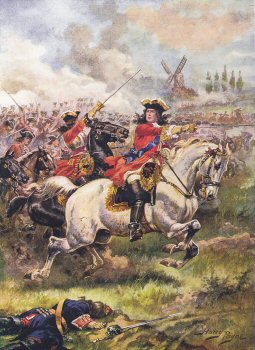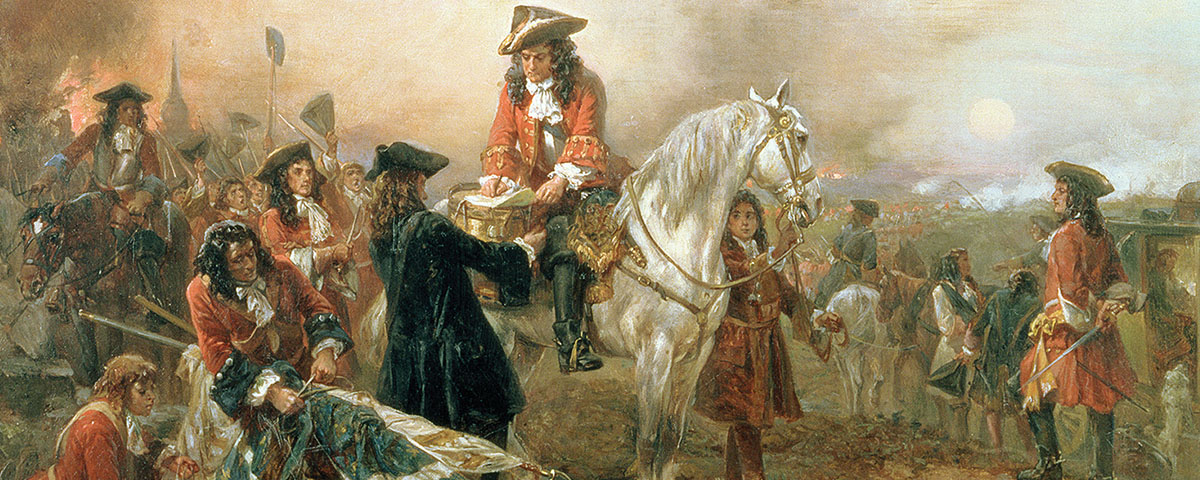4. After
Blenheim
Robert
Southey

ASSIGNMENTS
I.
(i)
Kaspar, was the old man.
His grandchildren,
Peterkin and Wilhelmine, were with him.
They were sitting in the sun
before their cottage door. (ii) Kaspar shook his head with a sigh to reflect
his disappointment at the war that took place years ago only to devour innocent
lives. Peterkin brought the skull of the “poor fellow”.
(iii) The skull was found
beside the small stream where Peterkin was playing.
The skull belonged to one of the many innocent
people who lost their lives in the tragic war. The 'poor' fellow became a
victim of the war.
(iv) The skulls were a
common sight there. Many of them could be found in the garden or in the field
that Kaspar used to plough.
(v) The victory of
England in the war of the Spanish Succession (1701-1714) is referred to here.
Duke of Marlborough end
Savoy's Prince Eugene were responsible for this victory.

II.
(i)
The cause of the war in which many innocent people were killed Is being
discussed here.
Peterkin and Wilhelmine
were innocent grandchildren of old Kasper. Peterkin was questioning his
grandfather, Kasper.
(ii) The adjectives ‘young'
and ‘little' are important to highlight the innocence and purity of Peterkin
and Wilhelmine. It is through their innocence that the poet, has condemned the
war.
(iii)
"Wonder-waiting eyes" is used for Wilhelmine, who was expecting to know
the cause of the war from her grandfather. The figure of speech used here is
alliteration.
She looked up with such
eyes because she could not comprehend the cause of the war. It filled her with
wonder. She anticipated to get a favourable answer from Kasper.
(iv) The battle was
fought between the English and the French forces. Peterlcin was not given a
satisfactory reply. Kasper did not know the cause of the war but still referred
to the victory as great. It shows that a common man’s ignorance and complacency
about the cause and purpose of war.
(v)Kaspar was a farmer.
He was loving grandfather as he spent
time with his grandchildren and tried to answer their queries. Kaspar was an
old man, who was disappointed with the outcome of the war. However, he was
complacent about the cause of war and had accepted the loss of innocent lives
as the inevitable price of victory in the war.

III (i) The
country referred to is Blenheim, Which
is the English name for the German village of Blindheim, situate on the left bank
of the Danube River in Bavaria in Southern Germany. It refers to the death and destruction caused by the
war.
(ii) The
speaker tells that during the war his father lived by a stream at Blenheim. As
a result of the war, his father's house was burnt which forced him to flee with
his wife and child, Kasper. They were thus rendered homeless.
(iii)”Childing
mother' is a phrase used for a mother expecting a baby. The poet specifically
refers to the deaths of childing mothers and newborn babies to underline not
only the horrors of war but also the irony of a famous victory.
(iv) The
speaker has been conditioned by the perpetrators of war in such a way that he
readily accepted the loss of innocent lives as the price for victory In the
war. I pity the speaker as he sighed at the sight of a poor fellow's skull but
his conditioning was such that he justified war.
(v) Refer to
Anti-War Poem under Critical Remarks.

IV. (i)
'They’ refers to those who must have reported the entire battle scene and its
after effects to Kaspar. (Kaspar experienced the war only as a child, thus his
account of the war to his grandchildren is not first-hand.)
The sight
was shocking because the war was won at the price of thousands of lives. The
sight of many thousand bodies lying rotting in the sun was gruesome.
(ii) Refer
to I, (v).
(iii) The tone
is ironical and sarcastic. The poet wants to question the utility of waging
war, which cause destruction of both human
lives and Property.
(iv) old
Kaspar appears to be a farmer by
profession. He lived in a cottage in a
countryside, where there was a stream nearby and he mentioned that he used to
find many skulls while ploughing the field. This indicates his profession.
iv) The
devastation caused by war is reflected through the following:
• The
presence of skulls all over the field.
• Kasper's
family rendered homeless when Kaspar's father's dwelling was burnt,.
• The deaths
of expecting mothers and newborn babies,
• The
gruesome sight of dead bodies lying on the battle field and rotting.

V. (i) Duke
of Marlbro was an English General. He
was the Commander of British forces in the War of the Spanish Succession. He
was praised because he defeated the French forces.
(ii) Prince
Eugene was an Austrian General, born in France. He is referred to as 'our good
Prince Eugene' because with Marlborough, he defeated the French at Blenheim.
(iii) Wilhelmine
did not approve the praise that Duke and Prince Eugene received because she
considered their act of killing innocent people in the name of victory as
wicked.
Yes, her
comment is appropriate as it is the common man who has to suffer where the
politicians and the rulers escape and idly boast of wars.
(iv) The
poem disapproves of any war as it brings with itself death, devastation, loss
and grief. The poet conveys that great victories are rendered useless when
everything else is lost.
(v) The poem
is relevant as it has a universal appeal. The poem is timeless and can be read
irrespective of the time it was written in. It is the common man and innocent
children who suffer in a war. Modern politicians dismiss the deaths of innocent
people in war by referring to them with the impersonal phrase: collateral
damage.
picture courtesy : Thanks Google
No comments:
Post a Comment